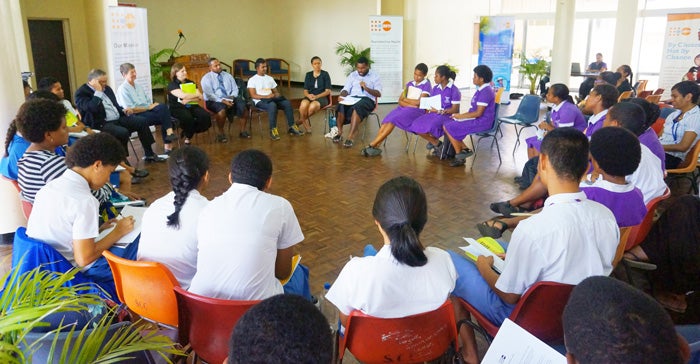QUESTIONING beliefs and practices which influence you, being critical thinkers and actors is fundamental to the idea of investing in, not just teenage girls, but in all teenagers, a 2016 World Population Day Inspirational Stories Collection speaker on the theme of Investing in Teenage Girls told young people gathered for the occasion on June 12.
University of the South Pacific teaching assistant Jope Tarai brought to a round-table talanoa session the issue of the environment within which teenage girls and boys today are experiencing their formative years in relation to investing in teen girls, discussing the realities and the ideals in which teenagers exist.

Mr Tarai defined realities as manifestations of one's influencers, for example, the social media selfie pout being a reality borne out of pop culture, informed by incessant images of pouting reality TV stars.
Acknowledging that as human beings, the propensity to do what one saw, thought of and/or felt like often enough was true for both young and old, he however reiterated the danger of a "monkey see, monkey do" approach to life, underlining the importance of questioning things.
Mr Tarai discussed cultural practices and religious beliefs as major influencers of our lives, both of which had their own sets of references and influences in direct relation to the teenage girl.
Mr Tarai discussed some agents of socialisation, for example, music videos whose subtle messaging implied that the less clothing on young women the more attractive they were supposed to be, or how young men and boys were "learning" from their realities that being polite was "lame".
"Let's not get started on the language where descriptions of women are likened to animals or intimate expressions of lust that skews and distorts your understanding of relationships. These are the small things, the small things that make the biggest difference," Mr Tarai said.
Mr Tarai proposes that (having) ideals which lead inquisitive minds to question the realities of images, personalities, colours and/or messages that influence teenagers was a starting point for self-awareness. Ideals guide thought-processes and inform discourse borne out of questioning.
"Being aware of these things leads us to question it. Simple questions like, why do we have to expect teenage girls to do it this way or that? What images, messages and influences lead to limiting the empowerment of teenage girls and most of all, being self-aware of how we treat one another and its implications," Mr Tarai said.
"At the end of the day, regardless of whom you are and what you want to become, it's about you and your decisions as teenagers. In among of all this, the greatest investment not only for teenage girls but for all teenagers is to become critical thinkers and actors.
"Only through thinking critically and engaging would you be able to observe and question the varying influences that shape the mind of teenage girls and teenagers in general. Whatever shapes your mind, if left unquestioned, could prove too influential that it could inadvertently disempower many.
"Sadly this is the case most of the time where we are limited by unquestioned influences of what surrounds us that become our beliefs."
WPD as an advocacy platform
The president of the National Youth Council, Wiliame Nayacatabu, commended the United Nations Population Fund for organising the Inspirational Stories Collection to mark World Population Day (WPD) which is globally observed annually on or around July 11.
Mr Nayacatabu, who made the closing remarks at the Inspirational Stories Collection event, reaffirmed the council's commitment to "continue to be the voice for the voiceless especially vulnerable youths of the nation".
"We thank the UNFPA for promoting the rights of teenage girls and for being the international platform to protect them and support them to determine their own destinies. Thank you for this program which allowed all of us to come and share but most importantly to learn from each other the importance of investing in young women," Mr Nayacatabu said.
"I urge all leaders of Fiji to take a bold step in investing in teenage girls and I urge all youths, students to join a youth group."
WPD was triggered by interest around the time the number of people in the world reached 5 billion. The governing council of the United Nations Development Program established the event in 1989.
The UNFPA believes fervently that investing in adolescent girls will be critical to real progress in the achievement of the Sustainable Development Goals (SDGs).
In the Pacific, UNFPA has provided technical support to 10 countries for the review of their education curriculum to ensure the family life subject is holistic, inclusive of life skills. If young people, particularly girls, have correct and timely reproductive health and services information, they can make informed decisions and have autonomy over their bodies.
Investing in teenage girls can make a difference in how nations fare as far as achieving the new sustainable development agenda is concerned. The SDGs calls on member states not to leave anyone behind. When we ignore situations which are barriers to girls reaching their full potential, we are guilty of leaving behind half of humanity.
Teena as critical thinkers and actors
Mr Tarai challenged students at the 2016 WPD Inspirational Stories Collection event to inculcate ideals described by Mahatma Gandhi in his statement: Your beliefs become your thoughts; Your thoughts become your words; Your words become your actions; Your actions become your habits; Your habits become your values; And your values become your destiny.
"Let us make investing in teenage girls being critical thinkers and actors part of our thoughts, actions, habits, values and most of all our destiny," Mr Tarai said.
"For who else can make this a reality but you the teenagers? You the future of Fiji, the leaders of tomorrow, the voice of today."
*This is the second of a series of articles on speakers' take on the 2016 World Population Day theme "Investing in Teen Girls" at the Inspirational Stories Collection talanoa in Suva, Fiji (June 12).

